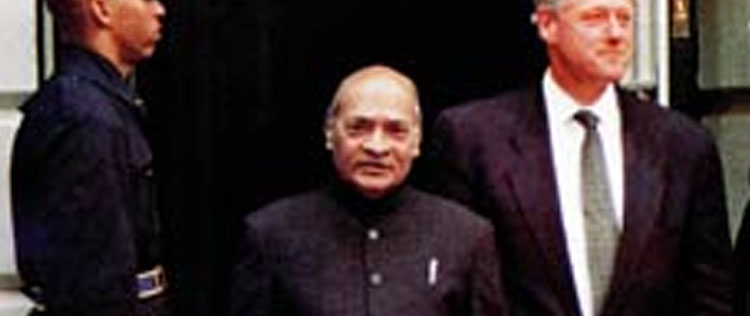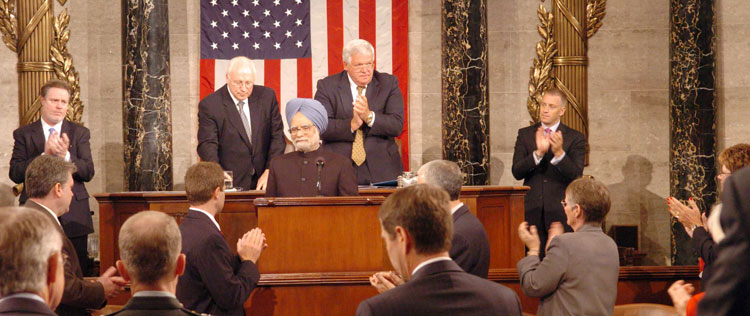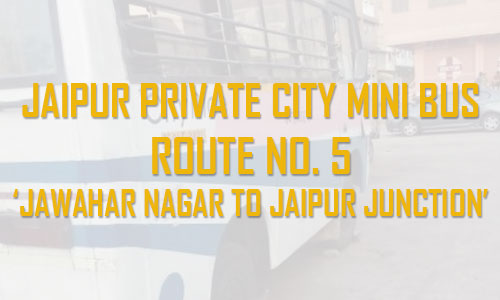Indian Prime Ministers who addressed the US Congress
It was a proud moment for many of the followers of Indian PM Narendra Modi, when he received an invitation to speak at joint session of US Congress at the White House on June 8, 2016.
There was a time when Modi was denied visa for over a decade and now he was there, addressing a joint session of the US Congress. When Modi first took office in the year 2014, not many would have thought that his relationship with the US would change this drastically. In 2005, Washington had denied visa to Narendra Modi, the then Chief Minister of Gujarat state. When Modi took the Prime Minister office, several questions were raised on how his personal relationship with Washington could pose issues to the Indo-US ties. But look at the things now. PM Modi has built a strong rapport with US President Barack Obama and the Indo-US relations have been deepened greatly.
Modi’s Address to the US Congress – June 8, 2016
PM Modi in his speech at the US Congress on Wednesday spoke about Pakistan, Yoga, terrorism, China, Siri and had a touch of humour in his speech. He said, “A strong India-US partnership can anchor peace, prosperity and stability from Asia to Africa and the Indian Ocean to the Pacific.” He also addressed US concerns on issues like intellectual property rights. He ended his speech with an optimistic view of the Indo-US ties, calling it as an ‘indispensable partner’.

His speech was not only applauded in the US Congress but many took to Twitter to admire his oratory skills as well.
However, Modi is not the only Indian Prime Minister to have received the honour of speaking at the US Congress. We have had 5 of our Prime Ministers, who addressed the US Congress, prior to PM Modi. One thing which is common between all is that – each one of them talked of strengthening Indo-US ties.
Jawaharlal Nehru’s Address to the US Congress – October 13, 1949
In the year 1949, just two years after India’s independence from the British rule, India’s first Prime Minister Jawaharlal Nehru addressed the US Congress on October 13. That was the time when India didn’t share a good relation with the then US President Harry S Truman and the US feared that India under Nehru was tilting toward the Soviet Union. At such time, Nehru attempted to enhance the Indo-US relations with his speech, reading out the preamble to India’s Constitution, which was influenced by the US Constitution. He said,

“You will recognize in these words that I have quoted an echo of the great voices of the founders of your Republic. You will see that though India may speak to you in a voice that you may not immediately recognize or that may perhaps appear somewhat alien to you, yet that voice somewhat strongly resembles what you have often heard before. Yet, it is true that India’s voice is somewhat different; it is not the voice of the old world of Europe but of the older world of Asia.”
He also sought cooperation from the US but at the same time he added that India doesn’t seek any material advantage in exchange for any part of its hard-won freedom.
Rajiv Gandhi’s Address to the US Congress – June 13, 1985
In his address to the joint meeting of the US Congress, Rajiv Gandhi talked about bringing India into the 21st century. He said, “Our task today is to bring India to the threshold of the 21st century,” “Free of the burden of poverty which is the legacy of our colonial past, and capable of meeting the rising aspirations of our people.”

At that time India’s ways with the Soviet Union were coming to an end and only America seemed to be a good choice for India. Rajiv Gandhi tried his best to enhance India’s relation with the US under President Ronald Reagan and he also succeeded to some extent.
Rajiv Gandhi also mentioned, “India is in support of independence for Afghanistan, which was that time occupied by troops from the Soviet Union.” The US government took this remark positively as before this India had always kept quiet about the presence of the Soviet Union.
PV Narasimha Rao’s Address to the US Congress – May 18, 1994
PV Narasimha Rao again repeated the same thing in his speech on May 18, 1994. He asked the US to put the Cold War behind it and to enhance Indo-US relations. Rao asked US to help India become the ‘largest free market in the world’ by increasing US investments in India.

By this time the Soviet Union had ended and the world had come to peace. It was the time when India needed to get stable on financial terms, which is why Rao asked US to have some business ties and increase trade between the two countries.
US President Bill Clinton had assured Rao of enhance the Indo-US relations and he stood up to his words.
Atal Bihari Vajpayee’s Address to the US Congress – September 14, 2000
In his speech on September 14, 2000, Atal Bihari Vajpayee again referred to enhancing the Indo-US relations, which had been struck by some bitterness due to the nuclear bomb test explosions conducted at the Indian Army’s Pokhran Test Range in May 1998. He also emphasized on business and military reforms.

Vajpayee said, “His government plans to double India’s per capita income within a decade. To achieve this order of growth we have ushered a comprehensive reforms,” “We are committed to releasing the creative genius of our people, the entrepreneurial skills of the men and women of the country, of its scientists and craftsmen.”
The IT sector was booming in India during this time.
Manmohan Singh’s Address to the US Congress – July 19, 2005
Manmohan Singh, who reached Capitol Hill, had not much challenges to face as the two countries already shared good relations. Some military and business reforms had already been signed.

During the same time, US President George W Bush proposed a US-India Civil Nuclear Agreement. During his address to the US Congress in July 2005, Manmohan Singh sought US’s support for India’s civil nuclear program and assured US saying, “India would be responsible with its nuclear resources and would use these technologies carefully.” “We have never been, and will never be, a source of proliferation,”
Later a deal related to India’s civil nuclear program was signed in the year 2008.












